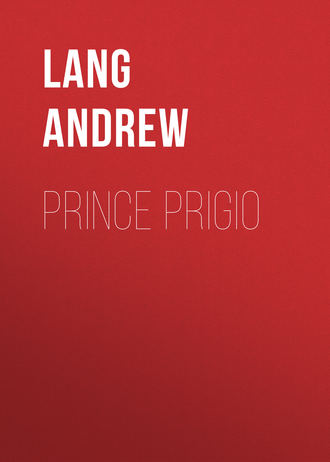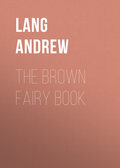
Lang Andrew
Prince Prigio
CHAPTER X
The Prince and the Remora.
If he had been too warm before, the prince was too cold now. The hill of the Remora was one solid mass of frozen steel, and the cold rushed out of it like the breath of some icy beast, which indeed it was. All around were things like marble statues of men in armour: they were the dead bodies of the knights, horses and all, who had gone out of old to fight the Remora, and who had been frosted up by him. The prince felt his blood stand still, and he grew faint; but he took heart, for there was no time to waste. Yet he could nowhere see the Remora.
“Hi!” shouted the prince.
Then, from a narrow chink at the bottom of the smooth, black hill, – a chink no deeper than that under a door, but a mile wide, – stole out a hideous head!
It was as flat as the head of a skate-fish, it was deathly pale, and two chill-blue eyes, dead-coloured like stones, looked out of it.
Then there came a whisper, like the breath of the bitter east wind on a winter day:
“Where are you, and how can I come to you?”
“Here I am!” said the prince from the top of the hill.
Then the flat, white head set itself against the edge of the chink from which it had peeped, and slowly, like the movement of a sheet of ice, it slipped upwards and curled upwards, and up, and up! There seemed no end to it at all; and it moved horribly, without feet, holding on by its own frost to the slippery side of the frozen hill. Now all the lower part of the black hill was covered with the horrid white thing coiled about it in smooth, flat, shiny coils; and still the head was higher than the rest; and still the icy cold came nearer and nearer, like Death.
The prince almost fainted: everything seemed to swim; and in one moment more he would have fallen stiff on the mountain-top, and the white head would have crawled over him, and the cold coils would have slipped over him and turned him to stone. And still the thing slipped up, from the chink under the mountain.
But the prince made a great effort; he moved, and in two steps he was far away, down in the valley where it was not so very cold.
“Hi!” he shouted, as soon as his tongue could move within his chattering teeth.
There came a clear, hissing answer, like frozen words dropping round him:
“Wait till I come down. What do you want?”
Then the white folds began to slide, like melting ice, from the black hill.
Prince Prigio felt the air getting warmer behind him, and colder in front of him.
He looked round, and there were the trees beginning to blacken in the heat, and the grass looking like a sea of fire along the plains; for the Firedrake was coming!
The prince just took time to shout, “The Firedrake is going to pay you a visit!” and then he soared to the top of a neighbouring hill, and looked on at what followed.
CHAPTER XI
The Battle.
It was an awul sight to behold! When the Remora heard the name of the Firedrake, his hated enemy, he slipped with wonderful speed from the cleft of the mountain into the valley. On and on and on he poured over rock and tree, as if a frozen river could slide downhill; on and on, till there were miles of him stretching along the valley – miles of the smooth-ribbed, icy creature, crawling and slipping forwards. The green trees dropped their leaves as he advanced; the birds fell down dead from the sky, slain by his frosty breath! But, fast as the Remora stole forward, the Firedrake came quicker yet, flying and clashing his fiery wings. At last they were within striking distance; and the Firedrake, stooping from the air, dashed with his burning horns and flaming feet slap into the body of the Remora.
Then there rose a steam so dreadful, such a white yet fiery vapour of heat, that no one who had not the prince’s magic glass could have seen what happened. With horrible grunts and roars the Firedrake tried to burn his way right through the flat body of the Remora, and to chase him to his cleft in the rock. But the Remora, hissing terribly, and visibly melting away in places, yet held his ground; and the prince could see his cold white folds climbing slowly up the hoofs of the Firedrake – up and up, till they reached his knees, and the great burning beast roared like a hundred bulls with the pain. Then up the Firedrake leaped, and hovering on his fiery wings, he lighted in the midst of the Remora’s back, and dashed into it with his horns. But the flat, cruel head writhed backwards, and, slowly bending over on itself, the wounded Remora slid greedily to fasten again on the limbs of the Firedrake.
Meanwhile, the prince, safe on his hill, was lunching on the loaf and the cold tongue he had brought with him.
“Go it, Remora! Go it, Firedrake! you’re gaining. Give it him, Remora!” he shouted in the wildest excitement.
Nobody had ever seen such a battle; he had it all to himself, and he never enjoyed anything more. He hated the Remora so much, that he almost wished the Firedrake could beat it; for the Firedrake was the more natural beast of the pair. Still, he was alarmed when he saw that the vast flat body of the Remora was now slowly coiling backwards, backwards, into the cleft below the hill; while a thick wet mist showed how cruelly it had suffered. But the Firedrake, too, was in an unhappy way; for his legs were now cold and black, his horns were black also, though his body, especially near the heart, glowed still like red-hot iron.
“Go it, Remora!” cried the prince: “his legs are giving way; he’s groggy on his pins! One more effort, and he won’t be able to move!”
Encouraged by this advice, the white, slippery Remora streamed out of his cavern again, more and more of him uncoiling, as if the mountain were quite full of him. He had lost strength, no doubt: for the steam and mist went up from him in clouds, and the hissing of his angry voice grew fainter; but so did the roars of the Firedrake. Presently they sounded more like groans; and at last the Remora slipped up his legs above the knees, and fastened on his very heart of fire. Then the Firedrake stood groaning like a black bull, knee-deep in snow; and still the Remora climbed and climbed.
“Go it now, Firedrake!” shouted the prince; for he knew that if the Remora won, it would be too cold for him to draw near the place, and cut off the Firedrake’s head and tail.
“Go it, Drake! he’s slackening!” cried the prince again; and the brave Firedrake made one last furious effort, and rising on his wings, dropped just on the spine of his enemy.
The wounded Remora curled back his head again on himself, and again crawled, steaming terribly, towards his enemy. But the struggle was too much for the gallant Remora. The flat, cruel head moved slower; the steam from his thousand wounds grew fiercer; and he gently breathed his last just as the Firedrake, too, fell over and lay exhausted. With one final roar, like the breath of a thousand furnaces, the Firedrake expired.
The prince, watching from the hill-top, could scarcely believe that these two awful scourges of Nature, which had so long devastated his country, were actually dead. But when he had looked on for half-an-hour, and only a river ran where the Remora had been, while the body of the Firedrake lay stark and cold, he hurried to the spot.
Drawing the sword of sharpness, he hacked off, at two blows, the iron head and the tail of the Firedrake. They were a weary weight to carry; but in a few strides of the shoes of swiftness he was at his castle, where he threw down his burden, and nearly fainted with excitement and fatigue.
But the castle clock struck half-past seven; dinner was at eight, and the poor prince crawled on hands and knees to the garret. Here he put on the wishing-cap; wished for a pint of champagne, a hot bath, and his best black velvet and diamond suit. In a moment these were provided; he bathed, dressed, drank a glass of wine, packed up the head and tail of the Firedrake, sat down on the flying carpet, and knocked at the door of the English ambassador as the clocks were striking eight in Gluckstein.
Punctuality is the politeness of princes! and a prince is polite, when he is in love!
The prince was received at the door by a stout porter and led into the hall, where several butlers met him, and he laid the mortal remains of the Firedrake under the cover of the flying carpet.
Then he was led upstairs; and he made his bow to the pretty lady, who, of course, made him a magnificent courtesy. She seemed prettier and kinder than ever. The prince was so happy, that he never noticed how something went wrong about the dinner. The ambassador looked about, and seemed to miss someone, and spoke in a low voice to one of the servants, who answered also in a low voice, and what he said seemed to displease the ambassador. But the prince was so busy in talking to his lady, and in eating his dinner too, that he never observed anything unusual. He had never been at such a pleasant dinner!
CHAPTER XII
A Terrible Misfortune.
When the ladies left, and the prince and the other gentlemen were alone, the ambassador appeared more gloomy than ever. At last he took the prince into a corner, on pretence of showing him a rare statue.
“Does your royal highness not know,” he asked, “that you are in considerable danger?”
“Still?” said the prince, thinking of the Firedrake.
The ambassador did not know what he meant, for he had never heard of the fight, but he answered gravely:
“Never more than now.”
Then he showed the prince two proclamations, which had been posted all about the town.
Here is the first:
TO ALL LOYAL SUBJECTS.
Whereas,
Our eldest son, Prince Prigio, hath of late been guilty of several high crimes and misdemeanours.
First: By abandoning the post of danger against the Firedrake, whereby our beloved sons, Prince Alphonso and Prince Enrico, have perished, and been overdone by that monster.
Secondly: By attending an unseemly revel in the town of Gluckstein, where he brawled in the streets.
Thirdly: By trying to seduce away the hearts of our loyal subjects in that city, and to blow up a party against our crown and our peace.
This is to give warning,
That whoever consorts with, comforts, aids, or abets the said Prince Prigio, is thereby a partner in his treason; and
That a reward of Five Thousand Purses will be given to whomsoever brings the said prince, alive, to our Castle of Falkenstein.
Grognio R.
And here is the second proclamation:
REWARD
THE FIREDRAKE
Whereas,
Our dominions have lately been devastated by a Firedrake (the Salamander Furiosus of Buffon);
This is to advise all,
That whosoever brings the horns and tail of the said Firedrake to our Castle of Falkenstein, shall receive Five Thousand Purses, the position of Crown Prince, with the usual perquisites, and the hand of the king’s niece, the Lady Molinda.
Grognio R.
“H’m,” said the prince; “I did not think his majesty wrote so well;” and he would have liked to say, “Don’t you think we might join the ladies.”
“But, sir,” said the ambassador, “the streets are lined with soldiers; and I know not how you have escaped them. Here, under my roof, you are safe for the moment; but a prolonged stay – excuse my inhospitality – could not but strain the harmonious relations which prevail between the Government of Pantouflia and that which I have the honour to represent.”
“We don’t want to fight; and no more, I think, do you,” said the prince, smiling.
“Then how does your royal highness mean to treat the proclamations?”
“Why, by winning these ten thousand purses. I can tell you £1,000,000 is worth having,” said the prince. “I’ll deliver up the said prince, alive, at Falkenstein this very night; also the horns and tail of the said Firedrake. But I don’t want to marry my Cousin Molly.”
“May I remind your royal highness that Falkenstein is three hundred miles away? Moreover, my head butler, Benson, disappeared from the house before dinner, and I fear he went to warn Captain Kopzoffski that you are here!”
“That is nothing,” said the prince; “but, my dear Lord Kelso, may I not have the pleasure of presenting Lady Rosalind with a little gift, a Philippine which I lost to her last night, merely the head and tail of a Firedrake which I stalked this morning?”
The ambassador was so astonished that he ran straight upstairs, forgetting his manners, and crying:
“Linda! Linda! come down at once; here’s a surprise for you!”
Lady Rosalind came sweeping down, with a smile on her kind face. She guessed what it was, though the prince had said nothing about it at dinner.
“Lead the way, your royal highness!” cried the ambassador; and the prince, offering Lady Rosalind his arm, went out into the hall, where he saw neither his carpet nor the horns and tail of the Firedrake!
He turned quite pale, and said:
“Will you kindly ask the servants where the little Persian prayer-rug and the parcel which I brought with me have been placed?”
Lord Kelso rang the bell, and in came all the servants, with William, the under-butler, at their head.
“William,” said his lordship, “where have you put his royal highness’s parcel and his carpet?”
“Please, your lordship,” said William, “we think Benson have took them away with him.”
“And where is Benson?”
“We don’t know, your lordship. We think he have been come for!”
“Come for – by whom?”
William stammered, and seemed at a loss for a reply.
“Quick! answer! what do you know about it?”
William said at last, rather as if he were making a speech.
“Your royaliness, and my lords and ladies, it was like this. His royaliness comed in with a rug over his arm, and summat under it. And he lays it down on that there seat, and Thomas shows him into the droring-room. Then Benson says: ‘Dinner’ll be ready in five minutes; how tired I do feel!’ Then he takes the libbuty of sitting hisself down on his royaliness’s rug, and he says, asking your pardon, ‘I’ve had about enough of service here. I’m about tired, and I thinks of bettering myself. I wish I was at the king’s court, and butler.’ But before the words was out of his mouth, off he flies like a shot through the open door, and his royaliness’s parcel with him. I run to the door, and there he was, flying right hover the town, in a northerly direction. And that’s all I know; for I would not tell a lie, not if it was never so. And me, and Thomas – as didn’t see it, – and cook, we thinks as how Benson was come for. And cook says as she don’t wonder at it, neither; for a grumblinger, more ill-conditioneder – ”
“Thank you, William,” said Lord Kelso; “that will do; you can go, for the present.”







